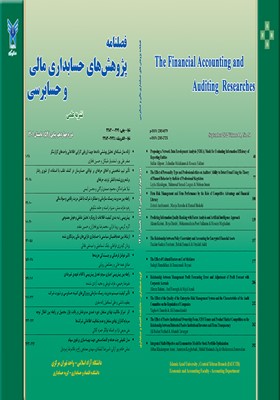The Effect of Cultural Factors on Cost Stickiness
Subject Areas :Sadegh Hamehkhani 1 , Ramazanali Royaei 2 *
1 - Department of Accounting, Kish International Branch, Islamic Azad University, Kish Island, Iran
2 - Department of Accounting, Tehran Research Branch, Islamic Azad University, Tehran, Iran
Keywords: individualism, collectivism, Keywords: Maleism, Womenism, Power Distance, Avoiding Uncertainty, Cost Stickine,
Abstract :
AbstractIn the accounting literature, attention has been paid to understanding how differences in national culture affect the outcomes and consequences of accounting and financial markets, so much of the research done in this area focuses on examining the impact of culture on broad management and reporting decisions. Accordingly, the aim of this study is to study the objective evidence of the relationship between small cultures on the cost-stickiness phenomenon. The statistical population of the study was 104 companies listed on the stock exchange during a 6-year period from 2014 to 2020. The research methodology is applied in terms of purpose, and in terms of its implementation, descriptive, survey and correlation type. Also, in order to analyze the data of the research using EVIEWS 9 and SPSS software, the results of hypothesis testing indicate that between the microcrops (masculinity / femininity, individualism / collectivism, power distance and avoidance of uncertainty) on the adhesion phenomenon Cost with a 99% confidence is significant
فهرست منابع
آشوری، داریوش، (1380)، "تعریفها و مفهوم فرهنگ"، تهران: انتشارات آگاه.
توحید فام، محمد، (1382)، "فرهنگ در عصر جهانی شدن، چالشها و فرصتها"، تهران: نشر روزنه، ص 45
حاجیها زهره و محدثه خراطزاده، (1393)، "رابطه فرهنگ سازمانی و کاربرد نوآوریهای حسابداری مدیریت در شرکتهای پذیرفته شده در بورس اوراق بهادار تهران"، حسابداری مدیریت، دوره7، شماره20، صص 25-42
رضازاده،جواد، (1381)، "رابطه فرهنگ با ارزش های حسابداری (محافظه کاری و پنهان کاری)"، پایان نامه دکتری حسابداری، دانشگاه علامه طباطبایی
عالیور، عزیز، (1385)، "حسابداری صنعتی"، جلد اول مفاهیم و کاربردها در هزینه یابی ، چاپ ششم، تهران ، مرکز تحقیقات تخصصی حسابداری و حسابرسی سازمان حسابرسی
محمد زاده مقدم، حسن، (1386)، "بررسی رفتار چسبندگی هزینه های اداری ، عمومی و فروش در شرکتهای ایرانی"،، پایان نامه کارشناسی ارشد حسابداری، دانشگاه آزاد اسلامی واحد بروجرد
نمازی، محمد و ایرج دوانیپور، (1389)، "بررسی تجربی رفتار چسبندگی هزینهها در بورس اوراق بهادار تهران"، بررسیهای حسابداری و حسابرسی، شماره62، صص 85-102
نمازی محمد و ایرج دوانی پور، (1389)، "بررسی تجزیه رفتار چسبندگی هزینه ها در بورس اوراق بهادار تهران"، فصلنامه بررسی های حسابداری و حسابرسی ، دوره 17 ، شماره 62 ، 82-102
نوروش، ایرج و زهرا دیانتی دیلمی، (1382)، "بررسی تاثیر فرهگ بر ارزشهای حسابداری در ایران (آزمون تجربی مدل گری)"، بررسیهای حسابداری حسابرسی، شماره33، صص 14-51
نوروش، ایرج، (1381)، "بررسی ارزش های فرهنگی در ایران و امکان دستیابی به هدف ارائه به نحو مطلوب استانداردهای بین المللی حسابداری"، فصلنامه علمی پژوهشی بررسی های حسابداری و حسابرسی. انتشارات دانشکده مدیریت دانشگاه تهران، سال نهم، شماره 30 ، صص 59-79
نیکوکرام، هاشم و مهدی محمدی، (1391)، "طراحی و ارائه مدل مفهومی ارزیابی نقش فرهنگ در تدوین استانداردهای حسابداری"، مجله مدیریت فرهنگی،دوره ششم، شماره 17، صص 29-53
Abdolmohammadi, M. J., & Sarens, G. (2011), “An Investigation of the Association between Cultural Dimensions and Variations in Perceived Use of and Compliance with Internal Auditing Standards in 19 Countries”, The International Journal of Accounting, 46(4), PP. 365–389.
Ahern, K., Daminelli, D., & Fracassi, C. (2012), “Lost in Translation? The Effect of Cultural Values on Mergers around the World”, Journal of Financial Economics (in press) .
Anderson, M., Banker, R., & Janakimaran, S. (2003), “Are Selling, General, and Administrative Costs “Sticky”?, Journal of Accounting Research, 41(1), PP. 47–63.
Banker, R., & Byzalov, D. (2014), “Asymmetric Cost Behavior”, Journal of Management Accounting Research, 26(2), PP. 43–79.
Banker, R., Byzalov, D., & Chen, L. (2013a), “Employment Protection Legislation, Adjustment Costs and Cross-country differences in Cost Behavior”, Journal of Accounting and Economics, 55(1), PP. 111–127.
Banker, R., Byzalov, D., & Threinen, L. (2013b), “Determinants of International differences in Asymmetric Cost Behavior”, Working paper . Temple University (Available at: http://astro.temple.edu/~dbyzalov/global.pdf).
Beck, B. E., & Moore, L. F. (1985), “Linking the Host Culture to Organizational Variables”, In P. J. Frost (Eds.), Organizational Culture, Beverly Hills, CA: Sage Publishers.
Berndt, E. R., & Morrison, C. (1981), “Capacity Utilization Measures: Underlying Economic Theory and an Alternative Approach”, American Economic Review, 71, PP. 48–53.
Botero, J. C., Djankov, S., La Porta, R., López de Silanes, F., & Shleifer, A. (2004), “The Regulation of Labor”, Quarterly Journal of Economics, PP. 1339–1380 (November) .
Bryan, S. H., Nash, R., & Patel, A. (2014), “Culture and CEO compensation”, Working Paper . Wake Forest University (Available at http://papers.ssrn.com/sol3/papers.cfm? abstract_id=2023530).

